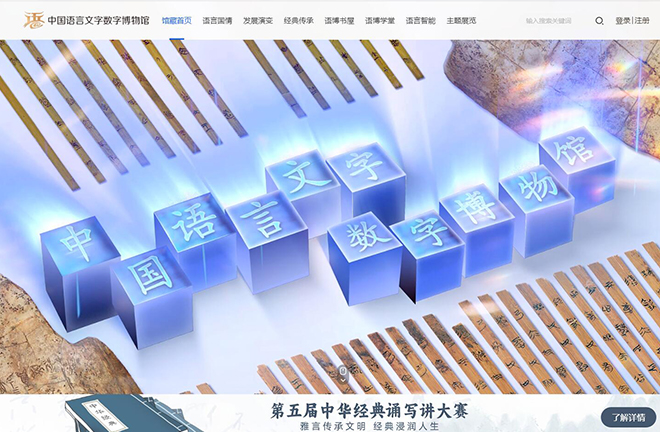Development paths for digital humanities in China

The Digital Museum of Chinese Language opened online in March 2023. Photo: Wang Youran/CSST
In recent years, significant progress in the field of information science and technology has provided traditional humanities research with innovative theories and methodologies, leading to the emergence of a new area of study known as “digital humanities.”
Digital humanities has become increasingly integrated into multiple disciplines. For example, within historical research, there is a growing emphasis on utilizing geographic information systems to visually represent and analyze both static and dynamic historical knowledge and events. Similarly, archaeological research has seen advancements in image analysis, color restoration, and digital reconstruction techniques. Progress has also been made in computational linguistics.
However, digital humanities in China is, by and large, still in its early stages of development. Firstly, the field lacks effective theoretical support and guidance. Secondly, digital technology is mostly integrated with a small number of disciplines such as history, archaeology, and linguistics. Most projects are limited to the digitization of traditional texts, as well as the preservation, simple analysis and presentation of digital works. Thirdly, there is a shortage of specialized talent. Given these problems, we propose three suggestions to foster a prosperous future for digital humanities.
Engineering mindset
The development of digital humanities can be viewed as a systematic engineering project. Engineering refers to the process of combining individual systems or functional units of a certain scale into a highly systematic whole with distinct modules. Implemented according to certain specifications, this process is characterized by standardized procedures and tools, modular functionality, advanced technology, optimal solutions, and system integration.
It is crucial to employ an engineering mindset to identify, comprehend, and address issues, which necessitates three primary stages: analyzing all elements to ascertain their characteristics, gradually and systematically integrating them based on principles of efficient operation, and generating standardized and modular products. In the realm of digital humanities, these “products” encompass resource platforms, applied technology standards, knowledge graphs, and more.
Broader and deeper integration
In terms of the breadth of integration, big data, artificial intelligence, speech recognition, 5G, virtual reality, blockchain and other technologies should be widely applied to economics, sociology, political science, and other humanities and social science disciplines in order to empower China’s development through digital transformation.
In terms of the depth of integration, we should strengthen platform construction for digital humanities. Emphasis should be placed on building network infrastructure and aggregating various useful databases with digital humanities tools. It is necessary to harness the latest technological advancements to deepen the integration of information technology with traditional disciplines.
Talent cultivation
Experience from other nations demonstrates that the cultivation of talent serves as the driving force behind the sustainable development of digital humanities. In China, several research centers dedicated to digital humanities have been established, with interdisciplinary experts playing a pivotal role. However, compared with other countries, few Chinese higher education institutions offer digital humanities programs and relevant courses, and technology remains the barrier for humanities scholars to engage in digital humanities research.
Therefore, Chinese universities with the necessary conditions should be encouraged to set up digital humanities programs and related courses for the purpose of cultivating specialized talent in this field. It is important to engage humanities scholars in digital humanities research by reducing technological barriers. Humanities scholars should make an effort to master basic information technology knowledge.
Jin Wei is an associate professor in the School of Humanities and Communication at the University of Sanya.
Edited by WANG YOURAN

 PRINT
PRINT CLOSE
CLOSE